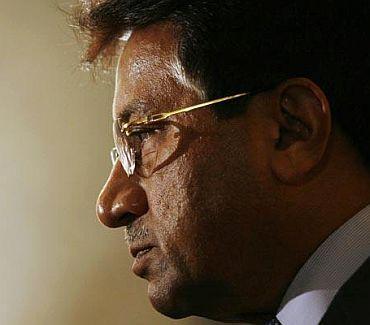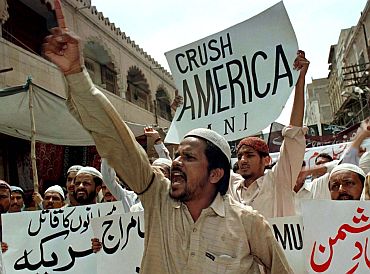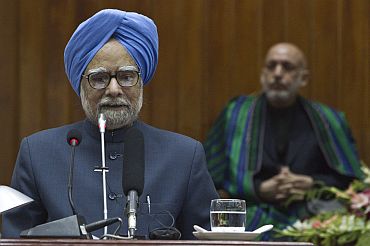 | « Back to article | Print this article |
Musharraf goes 'the anti-India way' for Pak polls
Apparently eyeing the 2013 polls, Pakistan's ex-President Pervez Musharraf raised anti-India rhetoric, claiming that the United States' "nuclear policy of appeasement and strategic cooperation" with New Delhi is seen in his home country as "an act of animosity."
Musharraf, who has announced his intention to return to Pakistan from self-exile next year with the aim to run for office in 2013, also blamed the US for terrorism inside his country.
"How did religious militancy get introduced into Pakistan? There is no doubt that Pakistan is a victim of terrorism and is certainly not the perpetrator," he wrote in an opinion piece on the CNN website.
"For 10 long years from 1979 to 1989, we gave birth to religious militancy under the call for 'jihad'. The freedom struggle in Kashmir started in 1989 and continues till now. It has tremendous public sympathy in Pakistan and has given birth to several Mujahedeen groups. This is another big cause of religious militancy in Pakistan," he said.
Please click NEXT to read more...
'US used Pak and then abandoned it'
Musharraf said the abandonment of Pakistan after 1989, with a strategic shift of the US policy towards India and military sanctions against Pakistan, cost US-Pakistan relations very dearly.
"In Pakistan's public mind, the United States 'used' Pakistan and then abandoned it: this was taken as a betrayal," he said.
"The US nuclear policy of appeasement and strategic cooperation with India against Pakistan is taken by the man in the street in Pakistan as very partisan and an act of animosity against our national interest," he said.
The continuing US military presence and operations in Afghanistan, indiscriminate drone attacks with increasing collateral damage in tribal areas and, finally, the violation of Pakistani sovereignty in the cross-border strike against Osama bin Laden "are all now seen most negatively by the people of Pakistan," said Musharraf, who was the mastermind of the failed Kargil misadventure.
'Malicious role of India in Afghanistan must not be overlooked'
He accused India of acting against Pakistan's interest inside Afghanistan, an allegation which has been denied by New Delhi and refuted strongly by both Kabul and Washington.
Both the US and Afghanistan say there is no such evidence and in fact have praised India for its developmental role.
"The malicious role of India and the Afghan government itself in maligning Pakistan's military and intelligence must not be overlooked. We know what Indian consulates in Kandahar and Jalalabad especially are doing. We also know that Afghan intelligence, military and foreign service personnel go for training in India.
"Not a single one comes to Pakistan, despite Pakistan's longstanding offer of free training since my time in office," Musharraf said.
"The ulterior Indian motive of creating an anti-Pakistan Afghanistan has to stop," he said and warned Afghan President Hamid Karzai that he must also understand this and stop, what he alleged, stabbing Pakistan in the back.
"Only the United States can ensure such an essential change. The Kashmir dispute needs an urgent, amicable settlement. That is the core towards stopping the religious militancy of the Kashmir-orientated Mujahedeen," Musharraf argued.


